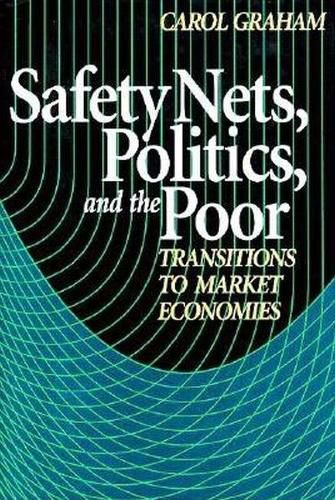Readings Newsletter
Become a Readings Member to make your shopping experience even easier.
Sign in or sign up for free!
You’re not far away from qualifying for FREE standard shipping within Australia
You’ve qualified for FREE standard shipping within Australia
The cart is loading…






Countries worldwide are attempting difficult transitions from state-planned to market economies. Most of these countries have fragile democratic regimes that are threatened by the high social and political costs of reform. Governments and ultimately societies have to make hard choices about allocating scarce public resources as they undergo these transitions. A central, often controversial, and most poignant question is how to protect vulnerable groups and the poor. What compensation, what
safety net
will be provided for them?
Carol Graham argues that safety nets can provide an environment in which economic reform is more politically sustainable and poverty can be permanently reduced. However, these two objectives frequently involve trade-offs, as vocal and organized opponents of reform (for obvious political reasons) often concern governments far more than the poor. These organized and less vulnerable groups tend to place heavy demands on the scarce resources available to governments at times of economic crisis. Governments that fail to address the social costs of reform, meanwhile, often face popular opposition that jeopardizes or even derails the entire market transition-the results of the September 1993 elections in Poland are a case in point.
The author examines these trade-offs in detail, with a particular focus on how political and institutional contexts affect the kinds of safety nets that are implemented. For example, reaching the poor and vulnerable with safety nets tends to be more difficult in closed-party systems, such as in Senegal, where entrenched interest groups have a monopoly on state benefits. In contrast, dramatic political change or rapid implementation of economic reform undermines the influence of such groups and therefore can provide unique political opportunities to redirect resources to the poor, as in the case of Bolivia and Zambia. Rather than focus their efforts on organized interest groups-such as public sector unions-which have a great deal to lose in the process of reform, governments might better concentrate their efforts on poor groups that have rarely, if ever, received benefits from the state. The poor, meanwhile, may gain a new stake in the ongoing process of economic and public sector reform through organizing to solicit the state for safety net benefits.
This is the first book to provide a detailed and comparative analysis of compensation during economic reform. Graham offers specific examples of resource allocation in three regions: Latin America, Africa, and Eastern Europe. She features case studies from Chile, Bolivia, Peru, Senegal, Zambia, and Poland.
$9.00 standard shipping within Australia
FREE standard shipping within Australia for orders over $100.00
Express & International shipping calculated at checkout
Countries worldwide are attempting difficult transitions from state-planned to market economies. Most of these countries have fragile democratic regimes that are threatened by the high social and political costs of reform. Governments and ultimately societies have to make hard choices about allocating scarce public resources as they undergo these transitions. A central, often controversial, and most poignant question is how to protect vulnerable groups and the poor. What compensation, what
safety net
will be provided for them?
Carol Graham argues that safety nets can provide an environment in which economic reform is more politically sustainable and poverty can be permanently reduced. However, these two objectives frequently involve trade-offs, as vocal and organized opponents of reform (for obvious political reasons) often concern governments far more than the poor. These organized and less vulnerable groups tend to place heavy demands on the scarce resources available to governments at times of economic crisis. Governments that fail to address the social costs of reform, meanwhile, often face popular opposition that jeopardizes or even derails the entire market transition-the results of the September 1993 elections in Poland are a case in point.
The author examines these trade-offs in detail, with a particular focus on how political and institutional contexts affect the kinds of safety nets that are implemented. For example, reaching the poor and vulnerable with safety nets tends to be more difficult in closed-party systems, such as in Senegal, where entrenched interest groups have a monopoly on state benefits. In contrast, dramatic political change or rapid implementation of economic reform undermines the influence of such groups and therefore can provide unique political opportunities to redirect resources to the poor, as in the case of Bolivia and Zambia. Rather than focus their efforts on organized interest groups-such as public sector unions-which have a great deal to lose in the process of reform, governments might better concentrate their efforts on poor groups that have rarely, if ever, received benefits from the state. The poor, meanwhile, may gain a new stake in the ongoing process of economic and public sector reform through organizing to solicit the state for safety net benefits.
This is the first book to provide a detailed and comparative analysis of compensation during economic reform. Graham offers specific examples of resource allocation in three regions: Latin America, Africa, and Eastern Europe. She features case studies from Chile, Bolivia, Peru, Senegal, Zambia, and Poland.